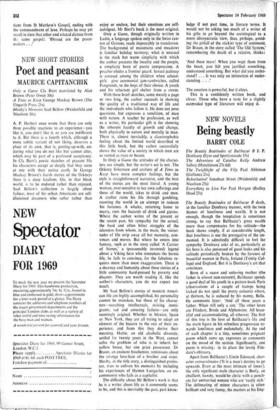NEW SHORT STORIES
Poet and peasant
MAURICE CAPITANCHIK
Only a Game Cla Biert translated by Alan Brown (Peter Owen 30s) A Time to Keep George Mackay Brown (The I logarth Press 21s) Mosby's Memoirs Saul Bellow (Weidenfeld and Nicolson 30s) A. P. Herbert once wrote that there are only three possible reactions to an experience—you like it, you don't like it, or you are indifferent to it. But there is a fourth which, although a more subtle variant of not liking, deserves a place of its own, that is, putting-up-with, en- during what you do not like but cannot alter, which may be part of a profound acceptance. In Cla Biert's poetic sketches of peasant life his characters accept so deeply that they seem at one with their native earth. In George Mackay Brown's harsh stories of the Orkneys there is a deep fatalism; life, in that bleak world, is to be endured rather than enjoyed. Saul Bellow's collection is largely about failure; most of his urban Americans are self- illusioned dreamers who suffer rather than enjoy or endure, but their emotions are self- indulgent. Mr Biert's book is the most original.
Only a Game, though originally written in Ladin, a language spoken only in the Swiss can- ton of Grisons, reads impeccably in translation. The background of mountains and meadows is familiar holiday territory; what is unusual is the stark but warm simplicity with which the author presents the locality and the people, a simplicity born of poetic compression. A poacher eludes a frontier guard. Sexual jealousy is aroused among the children when school- girls give ceremonial jam-sandwiches, called Pangronds, to the boys of their choice. A youth and his reluctant girl shelter from a storm.
With these brief sketches, some merely a page or two long, the author succeeds in showing the quality of a traditional way of life and the individuals who follow it. He does not pose questions, but expresses a condition, of man with nature. A teacher by profession, as well as a writer, his particular gift is for showing the inherent faculty of growth and change, both physically in nature and morally in man. There is, almost inevitably, a claustrophobic feeling about the limited world described in this little book, but the author successfully shows the value of a society in which men are as rooted as trees or beasts.
In Only a Game the attitudes of the charac- ters are simple, but the writer's art is not. The Orkney fishermen and crofters of A Time to Keep have more complex feelings, but the style is straightforward narrative, and the best of the stories are the most literal. A young woman, over-sensitive to her own sufferings and those of the world, takes to drink and men. A crofter ruins his life through gambling, roaming the world in an attempt to redeem his fortunes. A whaler, returning home to marry, runs the hazards of drink and gipsies. Where the author writes of the present or the recent past, his sympathy for the actual, the hard and often bitter struggles of the islanders from whom, in the main, the vicissi- tudes of fife strip away all but necessity, con- vinces and moves. But where be enters into fantasy, such as in the story called 'A Carrier of Stones,' a (presumably invented) legend about a Viking hero who renounces the heroic life, he fails to convince, for the fabulous re- quires more than mere exaggeration. There is a decency and humanity about these stories of a little community hard-pressed by poverty and disaster. They are worth reading if, like the author's characters, you do not expect too much.
Mr Saul Bellow's stories of modern Ameri- can life are highly accomplished, his personality cannot be mistaken, but those of his charac- ters—searching intellectuals, striving immi- grants, sad and amusing failures—are only seemingly original. Whether in Mexico, Spain or New York, they are all trying to adapt an element of the bizarre to the rest of their ex- perience, and from this they derive their meaning. Hattie, an old alcoholic divorcee, settled for twenty years in the West, cannot solve the problem of who is to inherit her yellow house, her one prize possession. Dr Braun, an eminent biochemist, reminisces about the strange love-hate of a brother and sister. Mosby, in the title story, a distinguished profes- sor, tries to enliven his memoirs by including his experiences of Hymen Lustgarten, an ex- communist who fails as a capitalist.
The difficulty about Mr. Bellow's work is that he is a writer about life as it commonly seems to be, and this is inevitably the past, past know- ledge if not past time, in literary terms. It would not be asking too much of a writer of his gifts to go beyond the sociological to a more idiosyncratic view, thus, perhaps, avoid- ing the pitfall of the stickier type of sentiment. Dr Braun, in the story called 'The Old System,' remembering the death of a relative, thinks:
'And these tears! When you wept them from the heart, you felt you justified something, understood something. But what did you under- stand? . . . It was only an intimation of under- standing . .
The emotion is powerful, but it cloys.
This is a confidently written book, and clever. Those who have a taste for a slightly outmoded type of literature will enjoy it.


































 Previous page
Previous page